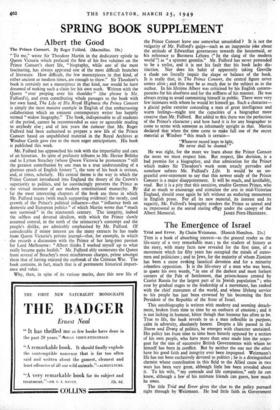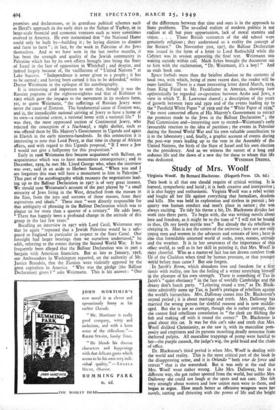The Emergence of Israel
Trial and Error. By Chaim Weizmann. (Hamish Hamilton. 21s.) This is a book of absorbing interest—to the general reader as the life-story of a very remarkable man ; to the student of history as the story, with many facts now revealed for the first time, of a movement which for fifty years has occupied the minds of states- men and politicians ; and to Jews, for the majority of whom Zionism has been a cause evoking fanatical devotion and for a minority relentless opposition. It is the life-story of a man who was born, to quote his own words, "in one of the darkest and most forlorn corners of the Pale of Settlement, that prison-house created ter Czarist Russia for the largest part of its Jewish population"; who rose by gradual stages to the leadership of a movement, has ranked with the chief statesmen of the world, and whose lifelong service to his people has just been crowned by his becoming the first President of the Republic of the State of Israel.
This autobiography is written With modesty and seeming detach- ment, broken from time to time by an outburst of emotion ; and it is not lacking in humour, bitter though that humour has often to be. True to life, the book reveals to us a man inflexible in purpose, calm in adversity, absolutely honest. Despite a life passed in the Sturm and Drang of politics, he emerges with character unstained. His policy has from time to time been bitterly opposed by a section of his own people, who have more than once made him the scape- goat for the sins of successive British Governments with whinn he himself has been in conflict. But by neither the one nor the other have his good faith and integrity ever been impugned. Weizmann's life has not been exclusively devoted to politics ; he is a distinguished chemist whose contribution in this field to the Allied cause in two wars has been very great, although little has been revealed about• it. To his wife, "my comrade and life companion," only he can know, although a few of his intimate friends can guess, how much he owes.
The title Trial and Error gives the due to the policy pursued right through by Weizmann. He had little faith in Government
promises and declarations, or in grandiose political schemes such as. Herzl's approach in the early days to the Sultan of -Turkey, or in large-scale financial and economic ventures such as were sometimes evolved in America. He ever maintained that " the National Home could only be built by—building it ; by laying diintim to diiniim and farm to farm " ; in fact, by the work in Palestine of the Jews themselves. And as we have seen in the last twelve months, it has been the strength and quality of the Jewish community in Palestine which has by its own efforts brought into being the State
of Israel in the face of opposition in Whitehall; despite, and indeed largely because of, the vacillations of "United Nations" at Lake Success. " Independence is never given to a people ; it has to be earned ; and having been earned it has to be defended," writes Doctor Weizmann in the epilogue of his autobiography.
It is interesting and important to note that, though it was the Russian pogroms of the eighteen-eighties and that of Kishinev in 1903 which gave the impatus to the movement in its modern form, yet, to quote Weizmann, " the sufferings of Russian Jewry were never the cause of Zionism. The fundamental cause of Zionism was, and is, the ineradicable national striving of Jewry to have a home of its own—a national centre, a national home with a national life." It was they, the most oppressed section of Continental Jewry, who rejected the conception of a Nachta.syl, a night shelter, such as was offered them by His Majesty's Government in Uganda and again in Elarish in the early nineteen-hundreds. In this connection it is interesting to note that Lord Percy, at that time- in charge of African affairs, said with regard to this Uganda proposal, " If I were a Jew I would not give a halfpenny for this proposition."
Early in 1906 Weizmann first became acquainted with Balfour, an acquaintance which was to have momentous consequences ; and in December, 1919, he met Mr. Lloyd George who, when the interview was over, said in an aside to Herbert Samuel, " When you and I are forgotten this man will have a monument to him in Palestine." That part of the autobiography which recounts the negotiations lead- ing up to the Balfour Declaration in 5917 is of very great interest. We should note Weizmann's account of the part played by " a small minority of Jews living in the West, detached from the masses in the East, from the joys and sorrows of those masses, from their aspirations and ideals." • These .men " were directly responsible for that ambiguity of phrasing in the Balfour Declaration which was to plague us for more than a quarter of a century." He adds later, " There has happily been a profound change in the attitude of this group in the last few years." Recalling an interview in 1917 with Lord Cecil, Weizmann says that he again " repeated that a Jewish Palestine would be a safe- guard to England in particular in respect to the Suez Canal. Our foresight had larger bearings than we ourselves understood," he adds, referring to the events during the Second World War. It has frequently been alleged that the Balfour Declaration was in part a bargain with American financiers. But as late as January, 1918, our Ambassadors in Washington reported, on the authority of Mr. Justice Brandeis, that the Zionists were violently opposed by the great capitalists in America. " Why was the pledge (the Balfour Declaration) given ? " asks Weizmann. This is- his answer: " One
of the differences between that time and ours is in the approach to State problems. The so-called realism of modern politics is not realism at all but pure opportunism, lack of moral stamina and vision. . . . Those British statesmen of the old school were genuinely religious ; they understood as a reality the concept .of the Return." On November 21st, 1917, the Balfour Declaration was issued in the form of a letter to Lord Rothschild while .the Cabinet was in session approving- the final text. Weizmann was• waiting outside within call. Mark Sykes brought the document out to him with the exclamation, " Dr. Weizmann, it's a boy! " Atid so ends book one. • Space forbids more than the briefest allusion to the contents of book two, with which, being of more recent date, the reader will be more familiar. There is a most interesting letter dated March, 1919, from King Faisal to Mr. Frankfurter in America, showing hoW
ti be
optimistically he regarded co-operation between Arabs and Jews, a view in which T. E. Lawrence shared ; a description of the yeat'S of growth between 192o and 1929 and of the events leading up 'to the " Passfield White Paper " of 1929 and the " White Paper of 1939," " the most concerted efforts of His Majesty's Government to retract the promises made to the Jews in the Balfour Declaration" ; the Peel Commission and—interesting now to record—Weizmann's early favourable reaction to the idea of partition ; the events in Palestine during the Second World War and his own valuable contribution to it in the laboratory ' - and, finally, a graphic account of events during Hite post-war years leading up to the vote in the Assembly of the United Nations, the birth of the State of Israel and his own election to the presidency. And sq we witness the sunset of al long apd arduous life and the dawn of a new day for those to whom that life















































 Previous page
Previous page